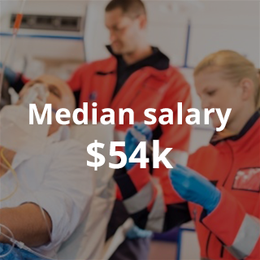Compare courses from top Australian unis, TAFEs and other training organisations.
Top Paying Jobs Straight Out of Uni
Nobody should pick a career based on the size of a pay cheque. But, to be frank, it doesn’t hurt to know what you’ll be earning in your first year out of uni. So undergrad students listen up: here are the top industries with the highest median salaries.
Vivien Luu
Feb 09,2015
After years living off a diet of Mi Goreng and whatever’s on sale at Coles, uni graduates would be forgiven for jumping at the first salary thrown their way. A steady income is, after all, a welcome change.
But not all university degrees are created equal. While nobody should make a career choice based entirely on the size of a salary package, it doesn’t hurt to know, straight out of the gate, which degrees and industries pay the best.
We take a look at the most recent Graduate Salaries report from Graduate Careers Australia and list the career paths with the fattest pay cheques. We also highlight industry opportunities and areas of growth to help you make savvy career choices.
It’s a bit of due diligence for those of you who are about to start studying or are thinking about it!
1. Healthcare
Unsurprisingly, the top place goes to dentists, optometrists and those who’ve studied medicine: graduates from each field earn a hefty median salary of $80k, $70K and $60K respectively in their first year out of uni.
And with Australia’s ageing population putting more pressure on health services, the demand for highly skilled health professionals is only set to rise. According to the latest Department of Employment projections, industry sectors such as medical services, allied health and hospitals are expected to experience a huge surge in growth over the near few years.
Being accepted into a medical or dentistry degree can be quite difficult, however, so there are always pathway options like a course in health to start you off. Or, if university isn’t your thing but you love the idea of working alongside a dentist, there’s always a Certificate III in Dental Assisting.
2. Engineering
Sitting pretty in second place are engineering graduates, who can expect to earn a median salary of $64k in their first year out of university.
While the Australian labour market is no longer suffering from a shortage of engineers, there are a handful of engineering disciplines that are highly sought after. According to Hays Quarterly January – March 2015 Report, a strong demand for revit drafters and modellers exists across mechanical and structural engineering, while structural engineers are increasingly needed to work on commercial and residential building projects.
So which engineering degree should you pick? It really depends on what sort of work excites you, and where your talents lie. But, as the latest report from Engineer’s Australia points out, certain degrees will offer more flexibility and employment opportunities than others.
For instance, the report states that ‘a graduate with a degree in civil engineering can choose to practice as a structural engineer, geotechnical engineer, coastal engineer or civil engineer’.
And if you take your studies a step further and complete a postgraduate course, your salary is expected to increase even further. The Graduate Salaries report, found that engineers who held a postgraduate degree such as a Master of Engineering (Engineering Management), were earning a median salary of between $95k-$100k.
3. Earth/Environmental Sciences
With natural resources dwindling and global temperatures rising, the field of earth sciences has never been more vital. Earth Science covers a broad array of disciplines and includes all fields of scientific inquiry into planet earth, from the earth’s atmosphere (e.g climatology, meteorology) to its hydrosphere (e.g oceanography) and lithosphere (e.g geology, glaciology).
Students who complete an undergraduate degree such as a Bachelor of Environmental Science can anticipate earning a median salary of $60k in their first year of employment, and can also expect enormous growth in the field in years to come.
Deloitte has tipped sectors such as ocean resources, clean coal, and gas as part of its top 25 sectors to expand in the next twenty years, while an IBISWorld forecast expects Australian coal seam gas revenue to grow by 148 per cent in 2015.
If a career in earth sciences piques your interest, check out our environmental courses.
4. Education
The median salary for newly graduated teachers is a respectable $57k and, best of all, education in Australia is set to rapidly expand as an industry.
According to Department of Employment statistics, school education will be Australia’s highest growing sector by 2018, producing approximately 58,000 new jobs between 2013 and 2018. Leading forecaster Deloitte has tipped subsectors such as private schooling and international education to be amongst the top 25 industries over the next two decades.
For those of you interested in becoming a primary school teacher, a course in Early Childhood Education will lay a solid foundation for your career.
But if you’re not 100 per cent certain, and don’t want to commit to a full degree, you can always get into the classroom first and get a feel for things with a course in Education Support. Alternately, if you’re passionate about travelling and teaching English to foreigners, a TESOL course is the way to go.
Keen on a career in education? Take a look at more education courses.
5. Law
After a gruelling four years at law school, graduates can anticipate a median salary of $55k in their first year of practising law in the real world.
The problem is, at present, Australia is experiencing an oversupply of law graduates, meaning it’s a highly competitive field in the jobs market right now for budding lawyers.
To stand out from the crowd our recommendation is to get as much experience under your belt as possible, and look for ways to diversify your skills or bring your knowledge of law to other disciplines.
According to Hays most recent overview of the law sector, there’s currently a strong demand for construction lawyers who have experience at PAE level as well as insurance litigators who specialise in professional indemnity and public liability.
You can begin your law career from a variety of entry points. Choose a Law Course or Juris Doctor course that’s right for you.
5. Physical sciences
Covering disciplines such as physics, astronomy and chemistry; students who graduate from the field of physical sciences will be sitting pretty in their first year out of university, with a median salary of $55k.
Qualifications and a solid education is a must if you want to work as an astronomer or physicist, so completing an undergraduate degree such as a Bachelor of Science (Applied Science) or Bachelor of General Studies (Science) is extremely important.
For those of you interested in specialising, there’s always a postgraduate degree such as the Graduate Certificate of Science (Astronomy), while the commitaphobes can always test the waters with a single study unit like Fundamentals of Chemistry.
Love science? Check it our other science courses.
7. Paramedical studies
While it’s certainly not for the faint-hearted, for those of you who love an adrenaline rush and can keep a cool head, being a paramedic graduate will prepare you to bring home a median salary of $54k in your first year out of university.
The work has a surprisingly good work-life balance, with most paramedics working on a rotating roster known as a ‘four by five’. This involves two day-shifts plus two night-shifts followed by five days off. Shifts are typically 12 hours, with paramedics clocking about 38 hours per week over a 10-week period.
The paramedic training here is also top-notch, with Aussie paramedics being highly sought on the international scene. The London Ambulance Service (LAS) recently hired nineteen paramedic graduates from Charles Sturt University, all of whom had completed the university’s Bachelor of Clinical Practice (Paramedic).
8. Information and Communications Technology (ICT)
Deloitte has dubbed the ICT industry ‘the gateway for our growth sectors’, and few would argue otherwise. Technology continues to play a significant role in driving economic growth and creating jobs and now, more than ever, we need tech-savvy individuals to step up and build this industry to its full potential.
In terms of shortages in ICT, Hays’ industry overview identified demand for:
- Front-end developers, particularly those with IOS and Android Native skills
- Cloud specialists, with organisations seeking out candidates with experience in Office 365, Azure and AWS
- Business analysts with SME knowledge
If this is the industry for you, check out the rest of our IT courses.
9. Accounting
Accountants can expect to earn a median salary of $50k in their first year of employment, while those who are happy to accept jobs in more remote regions of Australia will enjoy a higher wage.
Hays quarterly report on accountancy and finance found that there’s currently a high demand for experienced accountants in regional locations, meaning you’ll be more likely to receive a heftier pay cheque if you’re willing to relocate to a rural or remote area for work.
When it comes to building a career as an accountant, qualifications are just as important as ongoing training. So if you’re just starting out, you might want to look at a Bachelor of Business (Accounting) or, for those of you keen on becoming bookkeepers, try a Certificate IV in Bookkeeping.
Click here for more accounting courses.
9. Social sciences
Social science graduates, who complete their bachelor degrees and go on to work as criminologists or psychologists, can expect to rake in $50k in their first year of full-time employment.
According to Hays most recent quarterly report on trends in the healthcare system, Australia’s currently experiencing a shortage of clinical psychologists and accredited mental health professionals, with an acute demand for these professions in more remote regions.
If this is a career path that interests you, a great starting point is a course in social work or counselling. For a more specialised course, there’s always a Bachelor of Social Science (Criminology) or Certificate IV in Mental Health.
11. Architecture and construction
In their first year of work, recently graduated architects and construction specialists can anticipate earning a median salary of $49.2k, but they will also enjoy strong employment opportunities thanks to the construction boom that’s taking place this year.
There’s growth in both the retail and residential subsectors, so specialisations or any experience geared towards these disciplines will give your career a competitive edge.
Aspiring architects should consider completing an undergraduate degree such as a Bachelor of Applied Science (Architectural Science) to build themselves a solid foundation of knowledge and skills, whilst those wishing to work as construction managers should apply for courses like a Bachelor of Applied Science (Construction Management).
Want to take advantage of the building boom? Check out our courses in architecture, and building and construction.
Want to follow the money? Get qualified today with our range of courses.
About the author
Viv is a writer who enjoys researching and writing about creativity, how the human mind works, and neuro processes. She values creativity above all else and admires people who pursue their career dreams, no matter the sacrifice. In her spare time, she binges on HBO shows and epic fantasy novels.










